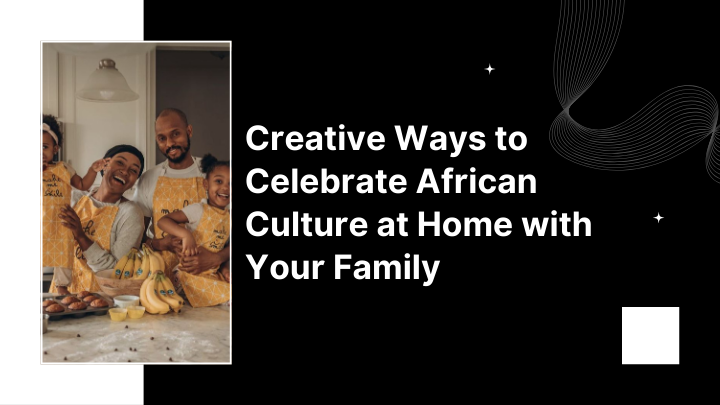Creative ways to Celebrate African Culture
Celebrating African culture at home can be a meaningful and fun way to stay connected with your roots while also educating your children about their heritage. By incorporating traditions from the diverse cultures across Africa into your daily life, you can create a home environment that fosters pride, appreciation, and understanding. Whether you're from an African background or simply want to explore and celebrate the continent’s vibrant cultures, here are 10 creative ways to celebrate African culture with your family at home.
1. Host an African-Themed Family Night
Set aside one evening each week or month for an African-themed family night. Choose a country or region in Africa to explore, and immerse your family in its traditions. You can start by learning about the history, culture, and food of that region. Cook a meal from the area together, watch a documentary or movie related to that culture, or even dress up in traditional clothing. This is a fun and educational way to teach your children about the diversity of African cultures while also having a great family bonding experience.
2. Tell African Folktales and Stories
African cultures are rich in oral traditions, with stories passed down through generations that teach valuable lessons about life, community, and the natural world. Incorporate storytelling into your family routine by reading or telling African folktales. You can also make up your own stories using themes and characters from African mythology. These stories often feature animals as symbols of wisdom, strength, or trickery, and they can spark engaging conversations and creativity in your family.
3. Cook Traditional African Dishes Together
Food is an integral part of African culture, and cooking traditional dishes is an excellent way to celebrate. Research recipes from different regions—whether it’s jollof rice from West Africa, injera with doro wat from Ethiopia, or bunny chow from South Africa—and cook together as a family. Cooking can be a hands-on activity for everyone, and tasting the diverse flavors will introduce your family to new culinary experiences. Encourage your children to learn about the ingredients, their origins, and the stories behind the dishes.
4. Learn African Dance and Music
African music and dance are not only entertaining but also an important part of cultural expression. Introduce your family to African rhythms by listening to music from various genres such as Afrobeat, highlife, or traditional drumming. You can even try learning some basic African dance steps together. Many African dances are full of energy and are a great way to have fun while learning about different cultures. Look for online tutorials or attend a local dance workshop to experience the rhythm firsthand.
5. Create African-Inspired Art and Crafts
Art plays a significant role in African traditions, with each region having its own distinct styles. Create African-inspired crafts with your family, such as painting vibrant geometric patterns like those found in traditional African textiles, making bead necklaces, or crafting masks using local materials. You can also experiment with African art techniques, such as batik fabric dyeing or creating pottery. This creative activity will allow your children to express themselves while learning about the symbolism and significance behind African art.
6. Decorate with African Art and Textiles
Incorporate African decor into your home by using vibrant textiles, traditional fabrics, and handmade crafts. Use items like African print cushions, woven baskets, carved wooden sculptures, and colorful tapestries to add a cultural touch to your living spaces. Decorate your walls with African artwork or hang a map of Africa in your home to inspire curiosity about the continent. African home decor often features bold patterns and natural materials, adding a warm and welcoming vibe to any room.
7. Practice African Languages and Phrases
Language is an essential part of culture, and learning a few words or phrases from an African language can be a fun and educational way to celebrate African heritage. Whether you speak a language from your country of origin or are interested in learning a new one, teaching your children some basic greetings or expressions can deepen their connection to their African roots. You can create a "word of the week" tradition, where each week you focus on a different African language or phrase, using it in daily conversations at home.
8. Celebrate African Holidays and Festivals
Many African holidays and festivals are filled with vibrant celebrations, music, food, and family traditions. Even if you are not living in an African country, you can still celebrate these occasions at home. Some holidays to consider include Kwanzaa, Africa Freedom Day, or traditional harvest festivals. Research the history and customs behind these celebrations, and involve your family in preparing for and celebrating them. You can create festive decorations, share special meals, or even invite friends and family over to join in the festivities.
9. Create an African Cultural Corner
Designate a space in your home as an African cultural corner. This could be a small bookshelf or table where you display African artifacts, books, photographs, music, and other items that celebrate your heritage. You can include things like traditional masks, instruments, or textiles. Change the displays periodically to feature different aspects of African culture or specific countries within Africa. This corner can serve as a space for your children to learn and explore more about the continent while also being a focal point for cultural pride.
10. Foster African Cultural Discussions
Encourage ongoing discussions about African culture within your family. Make it a point to regularly talk about the significance of cultural pride, the importance of preserving traditions, and how African cultures have influenced the world. You can read African history books together, discuss current events related to Africa, or watch documentaries that highlight the continent’s diversity. Discussing cultural topics helps children gain a deeper understanding of their heritage and its relevance in today’s global context.
Incorporating African traditions into your daily life is an enriching way to celebrate and honor your heritage. By using creative activities like storytelling, cooking, dancing, and arts and crafts, you can create a home environment where African culture is deeply appreciated and respected. These activities also provide your children with a sense of pride in their roots, helping them navigate their identities in a multicultural world with confidence and joy. The key is to make these celebrations an ongoing part of family life, ensuring that the beauty of African culture is passed down for generations to come.



